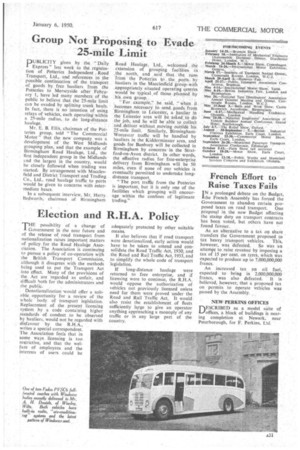Election and R.H.A. Policy
Page 33

If you've noticed an error in this article please click here to report it so we can fix it.
THE possibility of a change of
Government in the near future and of the release of road transport from nationalization raises important matters of policy for the Road Haulage Association. The Association is continuing to pursue a policy of co-operation with the British Transport Commission, although it disagrees with the methods being used to put the Transport Act into effect. Many of the provisions of the Act are regarded as unfair, and difficult hoth for the administrators and the public.
Denationalization 'would offer a suitable. opportunity for a review of the whole body of transport legislation. Replacement of the present licensing system by a code containing higher standards of conduct to be observed by hauliers, would not be regarded with disfavour by the R.H.A., writes a special correspondent. The Association feels that in some ways licensing is too restrictive, and that the welfare of employees and the interests of users could be adequately protected by other suitable means.
It also believes that if road 'transport were denationalized, early action would have to be taken to amend and consolidate the Road Traffic Act, 1930, and the Road and Rail Traffic Act, 1933, and to simplify the whole code of transport legislation.
If long-distance haulage were returned to free enterprise, and if licensing were to continue, the R.H.A. would oppose the authorization of vehicles not previously licensed unless need for them were proved under the Road and Rail Traffic Act., It would also resist the establishment of fleets sufficiently large to give an operator anything approaching a monoply of any traffic or in any large part of the country.




























































































